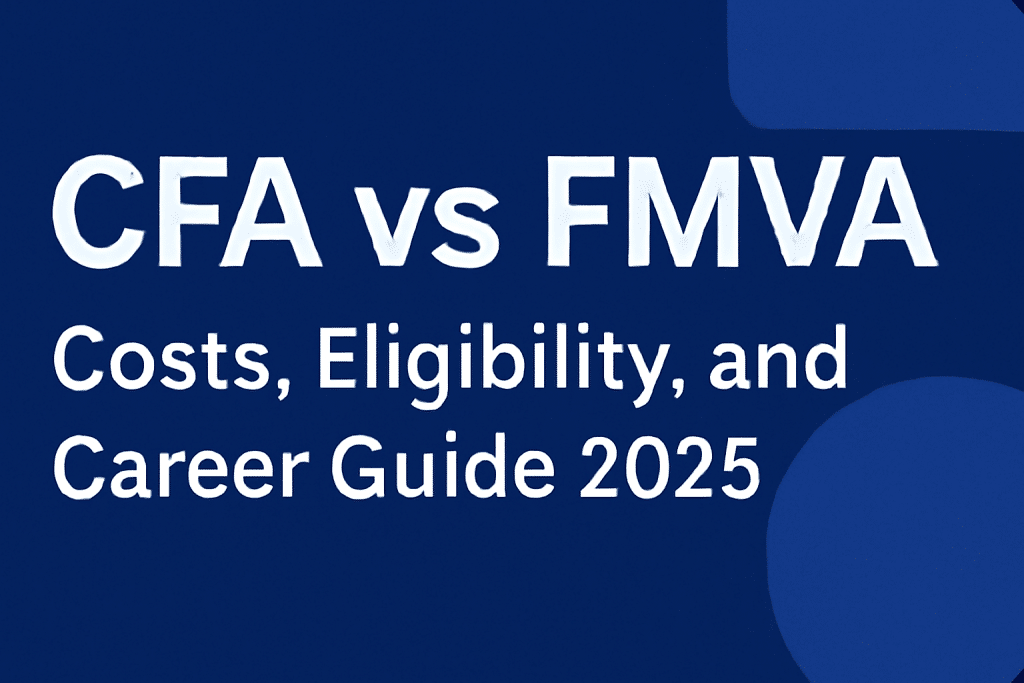The finance profession is evolving faster than ever. As AI-powered analytics, modern corporate finance, and global investment markets reshape job expectations, professionals are gravitating toward certifications that strengthen credibility and expand career opportunities. Two of the most recognized credentials in today’s finance ecosystem are the Chartered Financial Analyst (CFA) and the Financial Modeling & Valuation Analyst (FMVA). Many candidates start by reviewing an FMVA certification overview or exploring a more detailed FMVA certification guide for 2026 to understand how the credential fits into current industry needs.
Though both enhance career prospects, they serve very different purposes, require different commitment levels, and open doors to different types of roles. Many beginners assume CFA and FMVA compete with each other—but in reality, they are designed for different segments of the finance industry.
This article breaks down which certification is better, what FMVA costs, eligibility requirements, and career prospects, using structured analysis, comparison tables, real-world relevance, and 2026 market expectations.
CFA vs FMVA at a Glance — Quick Summary Chart
Before diving deeper, here’s a snapshot:
| Category | CFA | FMVA |
| Focus | Investments, portfolio management, equity research, global finance | Financial modeling, corporate finance, valuation, Excel analytics |
| Difficulty | Very high | Moderate |
| Duration | 2.5–4 years | 2–4 months |
| Exam Style | Three rigorous levels | Online modules + final exam |
| Cost | ~$3,200–$6,000 | $497–$847 |
| Eligibility | Bachelor’s degree or final-year student | No prerequisites |
| Career Fields | Investment banking, asset management, hedge funds, research | FP&A, valuation, corporate finance, data-driven finance roles |
| Salary Impact | High long-term ROI | Strong early-career ROI |
| Best For | Deep finance specialists | Practical, modeling-driven roles |
Each certification shines in different ways, depending on whether your career ambition revolves around markets or corporate finance analytics.
What Is the CFA? (A Complete Breakdown)
The CFA (Chartered Financial Analyst), awarded by the CFA Institute, is widely considered the gold standard in the investment profession. It is academically intense, globally respected, and focused heavily on investment theory, portfolio management, ethics, research analysis, and financial markets.
CFA Curriculum Overview
The CFA curriculum spans three levels:
CFA Level I
- Foundational finance principles
- Quantitative methods
- Ethics
- Financial reporting
- Equity, fixed income, derivatives, alternatives
CFA Level II
- Asset valuation
- Financial modeling
- Complex instruments
- Quant-heavy research applications
CFA Level III
- Portfolio management
- Advanced investment strategy
- Institutional wealth management
What Is the FMVA? (A Complete Breakdown)
FMVA (Financial Modeling & Valuation Analyst) is offered by the Corporate Finance Institute (CFI). It is modern, practical, and focused entirely on financial modeling, valuation, and analytics skills used in corporate finance jobs.
FMVA is designed for people who want hands-on skills rather than deep academic content.
FMVA Curriculum Overview
Core Topics
- Excel financial modeling
- Corporate finance strategy
- Capital budgeting
- PowerPoint reporting
- Valuation frameworks
- Scenario analysis
- Dashboarding & analytics
Electives
- Real estate modeling
- LBO modeling
- Mining, energy, and project finance
- ESG and data visualization
CFA vs FMVA — Cost Comparison (2026 Updated)
Cost plays a major role in deciding which credential is more practical.
FMVA Cost Breakdown
| FMVA Component | Cost |
| Self-Study Package | $497 |
| Full Immersion Package | $847 |
| Optional add-ons (certificates, templates) | Varies |
| Renewal (optional) | $197/year for continued access |
Total Cost Range: $497–$847
FMVA is significantly cheaper than CFA because it is fully online and self-paced.
CFA Cost Breakdown
CFA costs vary depending on early registration, exam attempts, and study materials.
| CFA Expense Category | Cost |
| One-time enrollment fee | $350 |
| Exam fee per level (early) | ~$940 |
| Exam fee per level (standard) | ~$1,250 |
| Study materials | $300–$1,000 |
| Total for 3 levels | $3,200–$6,000 |
FMVA is ~80% cheaper than CFA.
CFA vs FMVA — Eligibility Requirements
This is one of the biggest differentiators.
FMVA Eligibility
FMVA has no prerequisites.
You can enroll if you are:
- A student
- A beginner
- A professional from another background
- Someone switching careers to finance
It’s accessible and beginner-friendly.
CFA Eligibility
CFA requires:
Education Requirements
You must have:
- A bachelor’s degree or
- Be in your final undergraduate year or
- Have 4,000 hours of work experience or a combination of study and work
Additional Requirements
- Valid passport
- Ability to sit for exam in approved countries
- English proficiency
FMVA is open to everyone, but CFA requires verified education or experience.
CFA vs FMVA — Difficulty Level
This is often the most misunderstood part.
CFA Difficulty Analysis
The CFA exam is known worldwide for being extremely rigorous.
| CFA Level | Global Pass Rate (Approx.) |
| Level I | ~35% |
| Level II | ~40% |
| Level III | ~45% |
The depth of academic content, especially in fixed income, derivatives, and portfolio theory, makes CFA difficult even for experienced professionals.
CFA requires:
- 300–350 hours of study per level
- 3 levels
- Long-term focus
- Mastery of technical theory
The real challenge is commitment.
FMVA Difficulty Analysis
FMVA is much easier compared to CFA because:
- It is not exam-centric
- Modules can be repeated
- No time pressure
- No advanced academic content
The difficulty comes from mastering practical modeling, not passing exams.
Difficulty Verdict
| Category | Difficulty Verdict |
| CFA | Hard — academic, theoretical, multi-year commitment |
| FMVA | Moderate — practical, hands-on, beginner-friendly |
CFA vs FMVA — Time Required
Time is a major factor for busy professionals.
CFA Time Requirement
- Level I prep: ~300 hours
- Level II prep: ~350 hours
- Level III prep: ~350 hours
- Combined time: 900–1,200 hours
- Completion: 2.5–4 years
FMVA Time Requirement
- Total content: 100–120 hours
- Completion: 2–4 months
- Fully self-paced
FMVA is dramatically faster.
CFA vs FMVA — Career Paths Compared
This section covers real-world job outcomes, not theoretical benefits.
CFA Career Paths
CFA leads to roles involving markets, investments, and financial research.
Common CFA Job Titles
- Investment Analyst
- Portfolio Manager
- Equity Research Associate
- Credit Analyst
- Hedge Fund Analyst
- Fixed Income Analyst
- Wealth Manager
Industries
- Asset Management
- Investment Banking
- Hedge Funds
- Private Equity (support roles)
- Consulting (financial advisory)
FMVA Career Paths
FMVA focuses on practical financial modeling, making it ideal for analytics-driven roles.
Common FMVA Job Titles
- FP&A Analyst
- Corporate Finance Analyst
- Business Analyst
- Valuation Analyst
- Investment Banking Analyst (entry-level support roles)
- Data-driven finance roles
- Strategy & planning analyst
Industries
- Corporates (all sectors)
- Investment banking (middle office, support roles)
- Consulting
- Real estate finance
- Tech finance (FP&A, analytics)
Salary Comparison — CFA vs FMVA (2026 Updated)
Here’s what professionals earn in 2026 across different roles.
| Job Role | With CFA | With FMVA |
| Investment Analyst | $90,000–$130,000 | $60,000–$85,000 |
| Portfolio Manager | $120,000–$250,000+ | Rare |
| FP&A Analyst | $75,000–$105,000 | $70,000–$100,000 |
| Corporate Finance Manager | $110,000–$150,000 | $85,000–$125,000 |
| Equity Research Associate | $95,000–$140,000 | $55,000–$75,000 |
| Valuation Analyst | $80,000–$110,000 | $70,000–$95,000 |
| Hedge Fund Analyst | $150,000–$400,000+ | Rare |
| Strategy Analyst | $95,000–$130,000 | $75,000–$110,000 |
CFA offers higher long-term salary potential—especially in investment-heavy careers.
FMVA offers strong early-career earnings in corporate finance.
CFA vs FMVA — Which Is Better for Beginners?
Beginners entering finance often struggle to decide between academic depth (CFA) and practical corporate finance skills (FMVA). Here’s how both compare for early-stage careers.
FMVA for Beginners
FMVA is ideal for beginners because:
- There are no eligibility requirements
- The learning curve is smoother
- Content focuses on hands-on modeling, not theory
- You immediately build job-ready Excel and valuation skills
- You can complete it within a few months
If you’re new to finance or want a faster entry into corporate roles, FMVA is the easier and more practical starting point.
CFA for Beginners
CFA is ideal for beginners who:
- Want long-term careers in investments
- Are committed to studying deeply academic content
- Aim to join banks, asset management firms, or research houses
- Want global recognition
However, CFA’s workload is intense and may overwhelm beginners without strong math or accounting fundamentals.
CFA vs FMVA — Which Is Better for Career Switchers?
This depends heavily on what role a career switcher wants.
FMVA for Career Switching
FMVA is generally better for people switching from:
- Accounting → Finance
- IT/Data → Finance
- Operations → FP&A
- Engineering → Corporate finance
- Marketing → Analytics roles
Why?
- It teaches Excel modeling, the core skill of finance teams
- It helps people transition into practical corporate roles
- Companies value FMVA-certified talent in FP&A and valuation teams
CFA for Career Switching
CFA works best for people switching into:
- Investment research
- Equity analysis
- Portfolio management
- Wealth advisory
- Risk management
However, these fields require more than passing exams—they often require internships, entry-level roles, and strong market knowledge.
CFA vs FMVA — Which Is Better for Salary Growth?
Salary growth depends on your field.
CFA and Salary Growth
CFA has stronger long-term earning potential in:
- Asset management
- Hedge funds
- Investment banking
- Portfolio management
CFA professionals often command high six-figure salaries after gaining experience.
FMVA and Salary Growth
FMVA helps you earn well in:
- Corporate finance
- FP&A
- Valuation
- Strategy
Growth is steady but typically tops out lower than CFA roles, unless you move into management.
CFA vs FMVA — Which Certification Is Better Recognized?
Recognition is another key difference.
CFA Recognition
CFA is:
- Globally recognized
- Considered a premium credential
- Valued in investment banking, hedge funds, and research
- Equivalent to a graduate-level finance qualification
It has deep brand value and prestige.
FMVA Recognition
FMVA is:
- Popular in corporate finance
- Recognized by consulting firms
- Common in FP&A and analyst roles
- Modern and practical
However, FMVA is not globally prestigious like the CFA. It is respected but not elite.
CFA vs FMVA — Which Certification Is Better in 2026?
This depends entirely on your career destination.
Market Trends (2026)
CFA Trends
- Investments increasingly require credentialed professionals
- AI-driven finance requires strong theoretical knowledge
- Hedge funds and asset managers prefer CFA charterholders
FMVA Trends
- Corporate finance is shifting to data-driven modeling
- Companies are hiring more FP&A analysts than ever
- Modern tools (Power BI, advanced Excel, Python-lite) make FMVA even more relevant
- Many CFO-track careers start with FP&A + modeling expertise
Summary Table — Best Certification by Scenario
| Scenario | Best Option |
| You want to work in investment banking | CFA |
| You want a corporate finance or FP&A job | FMVA |
| You want global prestige | CFA |
| You want a practical, job-ready credential | FMVA |
| You want to become a portfolio manager | CFA |
| You want to learn valuation + modeling | FMVA |
| You need a fast and affordable certification | FMVA |
| You want the highest earning potential | CFA |
| You want to switch careers quickly | FMVA |
| You want to commit to long-term academic finance | CFA |
CFA vs FMVA — Final Verdict
Neither certification is “better” universally. The right choice depends on your career direction:
Choose CFA if you want:
- A career in investments, asset management, or research
- Global recognition and long-term prestige
- High theoretical mastery of finance
- Roles with six-figure+ earning potential
- A long-term, academically rigorous credential
Choose FMVA if you want:
- Practical skills quickly
- A career in corporate finance, FP&A, valuation, or analytics
- Affordable certification
- To build hands-on modeling abilities
- To switch into finance without prerequisites
Many professionals even pursue both—FMVA for technical skills and CFA for theoretical depth.
One or two mentions of Cert Empire are appropriate here, so:
Some professionals also use supplemental practice materials from platforms such as Cert Empire to strengthen quantitative fundamentals before attempting rigorous exams like the CFA.
Frequently Asked Questions (FAQ)
Is CFA harder than FMVA?
Yes. CFA is significantly more difficult, academically deeper, and requires multi-year commitment. FMVA is practical and moderately challenging.
How long does it take to finish FMVA?
Most learners complete FMVA in 2–4 months depending on schedule and pace.
Which certification helps you get a job faster?
FMVA helps beginners land corporate finance and FP&A roles more quickly because it provides immediate practical skills.
Do employers value CFA?
Yes, especially in investment banking, asset management, hedge funds, and equity research.
Does FMVA help with investment banking?
FMVA helps with modeling skills but does not replace CFA or IB-specific experience. It is more suited to corporate finance.
Can I pursue both CFA and FMVA?
Yes. Many professionals complete FMVA early for skill-building and later pursue CFA for long-term career growth.
Is FMVA worth the cost?
For FP&A, valuation, and corporate finance careers, FMVA provides strong ROI due to its low cost and practical nature.
Conclusion
CFA and FMVA are two of the most influential certifications shaping finance careers in 2026. CFA offers industry prestige, deep academic understanding, and powerful long-term potential for investment roles. FMVA provides job-ready modeling skills, faster entry into finance, and immediate corporate opportunities.
Choosing between them depends on your goals:
- If you’re aiming for markets, research, or investment management → CFA is the right path.
- If you want corporate finance, FP&A, or valuation roles → FMVA delivers faster and more practical value.
Whether you choose the analytical intensity of the CFA or the hands-on modeling expertise of the FMVA, both certifications strengthen your credibility and open doors across today’s fast-changing finance landscape.
Resources
- CFA Institute — https://www.cfainstitute.org
- Corporate Finance Institute (CFI) — https://www.corporatefinanceinstitute.com
- Bureau of Labor Statistics — Financial Analyst Overview
- Investopedia — Financial Modeling and Certifications
NACE Salary Data — Finance Roles


























